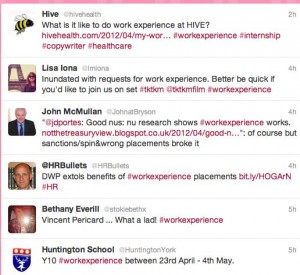 Most schools will organise 1-2 weeks work experience for their pupils, typically in years 9, 10 and 11. These placements are often organised by the school but there is unlikely to be opposition if you can help your child find their own quality work experience with a responsible employer.
Most schools will organise 1-2 weeks work experience for their pupils, typically in years 9, 10 and 11. These placements are often organised by the school but there is unlikely to be opposition if you can help your child find their own quality work experience with a responsible employer.
In addition to these short placements, there are significant advantages in helping your child to find additional work experience.
This may be a paid job or voluntary work. It may take place for a block of time, for example over the long summer break, on weekends or evenings over a longer period or during a gap year.
- Work placements give your child a chance to find out more about careers they may be thinking about.
- Practical experience in a chosen field will give your child a better idea of whether it will suit them.
- Getting some work experience can significantly improve your child’s chances when applying to university, particularly for vocational courses such as medicine, veterinary science, agriculture or engineering.
- Workplace contacts could be helpful later in their career
- Encourage your son or daughter to start looking at least six months before they want to start – even longer in popular sectors such as the media. Many organisations have at least year-long waiting lists.
- Help them come up with a list of the different industries or professions they want to explore and make a list of companies and organisations in that field – big and small
- Encourage them to think of the practicalities – How far can they travel? How much will it cost? How much time can they commit?
- Make a list of all your personal contacts
- Use Twitter #workexperience (e.g. “can anyone help with work experience placement for aspiring animal nurse 17yr old student in Reading area?”)
- Encourage them to follow the websites, twitter streams, blogs and forums related to the industry or company they are interested in
- Use Linked In (and track friends of friends etc)
- Help them compose a speculative letter to prospective companies
- Encourage them to think laterally – work experience can be self employment! (for example, your son wants to work with animals but there are no placements locally – maybe he could set up a dog-walking service?)
Further resources
All About Careers is an excellent website which has information on all aspects of planning and finding work experience.
Direct Gov is also useful and comprehensive on organising and getting maximum benefits from work experience.
Prospects is the graduate careers website but much of their information on work experience applies to pre-university students.
The National Citizen Service is full of ideas, personal stories and geared towards year 11 students who want to participate in a structured programme of work experience and skills development.
Money
If your family is getting benefits or tax credits, it’s important to check beforehand whether your child doing a work placement will affect your entitlement. Contact Jobcentre Plus for more information on benefits, HM Revenue and Customs (HMRC) for information on tax credits. Similarly, if your child is doing paid work, then this can affect any money they receive for staying in education after 16. Check with the support officer in their school or college.
In this audio clip Kawei, a student from South Wales describes her work experience, prior to going to university.
[peckplayer id=”2″ sound=”http://careerstalk.org/wp-content/uploads/2012/04/kawaiworkexperience2-2.mp3″]
Now she is at university, Kawei is thinking about how undertaking more work experience might help her career.
[peckplayer id=”2″ sound=”http://careerstalk.org/wp-content/uploads/2012/04/kawaiworkexperience3.mp3″]

